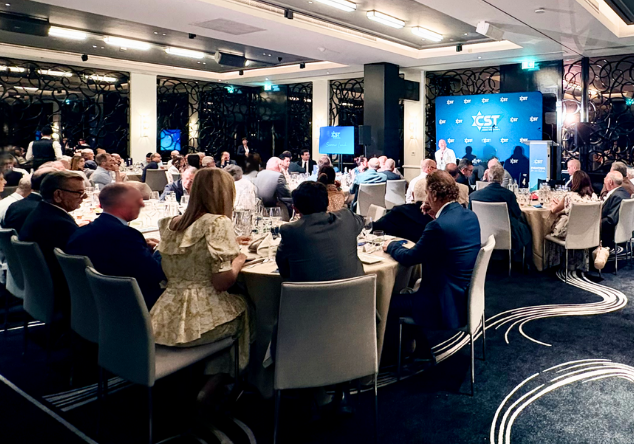CST Blog
Engaging with UCU
19 January 2010
David Hirsh, a leading figure in the Engage grouping, and one of Britain's foremost thinkers and campaigners against antisemitism, has addressed a "seminar" on antisemitism and the Holocaust, organised by the University and College Union (UCU). Professor Robert Fine, another leading figure in the struggle against contemporary antisemitism is also due to address another of these seminars.
Hirsh and Fine should both be thanked for their integrity, commitment and courage.
Hirsh's excellent speech may be read on the Engage website. It is well worth reading in full and catalogues UCU's repeated failings to seriously consider antisemitism and related issues. The failures would appear to be quite obviously rooted in the union's fervent anti-Israel stance, particularly its numerous attempts to boycott Israeli academia.
The meeting addressed by David Hirsh is one of three one-day seminars organised by UCU. In their words:
about the dangers of anti-Semitism to coincide with Holocaust Memorial Day on 27 January 2010.
Jeremy Newmark of the Jewish Leadership Council, told the Jewish Chronicle that the seminars:
are a shameful attempt by UCU to create a fig-leaf for its discriminatory boycott policies. Until UCU investigates the resignations of its Jewish members, apologises for promoting an anti-Jewish hate speaker, abandons its boycott obsession and accepts the findings of the Parliamentary Committee Against Antisemitisms report, it is institutionally incapable of lecturing others about fighting antisemitism.
The statement accurately summarises the response of many, including myself, to UCU's announcement of these seminars; and the fact that they are timed to coincide with Holocaust Memorial Day compounds my distaste.
Nevertheless, the fact remains that UCU has seen fit to invite figures of the calibre of David Hirsh and Robert Fine, and other notable thinkers such as Brian Klug and Philip Spencer, to address these seminars. It may well simply remain a "fig-leaf", but we should note that UCU has done more on this occasion than on all too many previous ones, when they have not shown the remotest understanding or concern. Of course, time will tell.
-------
Postscript
Curiously, the "seminars" became known at around the time of UCU's trenchant defence of South African activist, Bongani Masuku. A coalition of Jewish representative groups, including CST, had issued a public statement on this, which ended as follows:
UCUs hosting of Masuku and their refusal to engage with the concerns of the Jewish community follows a pattern: the Union refused to address the resignations of large numbers of Jewish academics from UCU in recent years, and summarily rejected members complaints of antisemitism. UCU has allowed its politics on Israel to override the concerns of its Jewish members and students. It appears that UCU simply does not care about the anti-Jewish impact of its activities.
It is now hard to see how UCU can continue to play a constructive role in the Government Group on Antisemitism and Higher Education when its latest actions are likely to encourage antisemitism. The Government should review UCUs membership of this group as it has failed to oppose antisemitism inside its own structures. UCU cannot credibly be a part of the solution to antisemitism while its activities are encouraging the problem.
Mark Wolfson, writing about the UCU and Masuku on the blog of the Union of Jewish Students, concluded with this:
How organisations like the UCU can associate with convicted hate-speakers [like Masuku] is bewildering. How they can sit on the Government Group on Antisemitism is simply inexplicable. We are seeing an increasingly narrow political space for discussion on the Arab-Israeli conflict. This is dangerous: Jews and supporters of Israels right to exist have already been hounded out of the UCU; how long will it be before some university campuses become no-go areas for Jewish and pro-Israel students?
The tragedy of this obsession is twofold: firstly, the duty of care no longer applies to these students and academics. Secondly, proponents of Israel boycotts will never be challenged to recognize that their reasoning is flawed, their tactics malicious and their leaders wrong. It seems that the line of anti-Zionism and antisemitism has not been crossed: it has been erased.
On CST Blog, Dave Rich noted the use of a potentially antisemitic joke in a UCU meeting
The campaigns for and against an academic boycott by UCU are both primarily domestic British campaigns. The anti-boycott campaign is not based in or funded from America. So why did Wallis choose to crack a joke about bank balances from Lehman Brothers, and not bank balances from Northern Rock? Why did he think a New York-based investment bank with a Jewish name was a more suitable prop for his joke than a UK-based high street bank?...
This is where the antisemitism in the comment becomes clear. The joke works because it is about big American Jewish money coming after the little UCU
Contemporary antisemitism normally works through resonances with older, deep-rooted antisemitic topoi of which the person expressing the antisemitic idea is often unaware. I do not accuse Wallis of intending to express an antisemitic idea, or even of understanding how he did. It is clear from his reaction that he is horrified by the notion that this is what he did; but he transmitted an antisemitic idea nonetheless. That his anti-racist literacy stops short of recognising how this is the case, says everything about the blind spot that his part of the left has to contemporary antisemitism.
Read More

Antisemitic Incidents Report January-June 2025
6 August 2025

CST Summer Lunch 2025
25 June 2025
CST Annual Dinner 2025
26 March 2025
